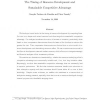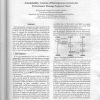365 search results - page 32 / 73 » Semi-automatic derivation of timing models for WCET analysis |
124
click to vote
ASC
2007
14 years 12 months ago
2007
Stability is one of the most important subjects in control systems. As for the stability of nonlinear dynamical systems, Lyapunov’s direct method and linearized stability analys...
MANSCI
2007
14 years 11 months ago
2007
We develop a formal model of the timing of resource development by competing …rms. Our aim is to deepen and extend resource-level theorizing about sustainable competitive advant...
107
click to vote
JCM
2007
14 years 11 months ago
2007
Abstract— This contribution analytically studies the influence of IQ mismatch on the performance of multiple-antenna orthogonal frequency division multiplexing (OFDM) systems ba...
ITC
1999
IEEE
15 years 4 months ago
1999
IEEE
Design diversity has long been used to protect redundant systems against common-mode failures. The conventional notion of diversity relies on "independent" generation of...
CODES
1998
IEEE
15 years 4 months ago
1998
IEEE
Telecommunication systems are often specified in the standardized languages SDL and MSc. These languages allow only the specification of pure functional aspects. To remedy this pr...


